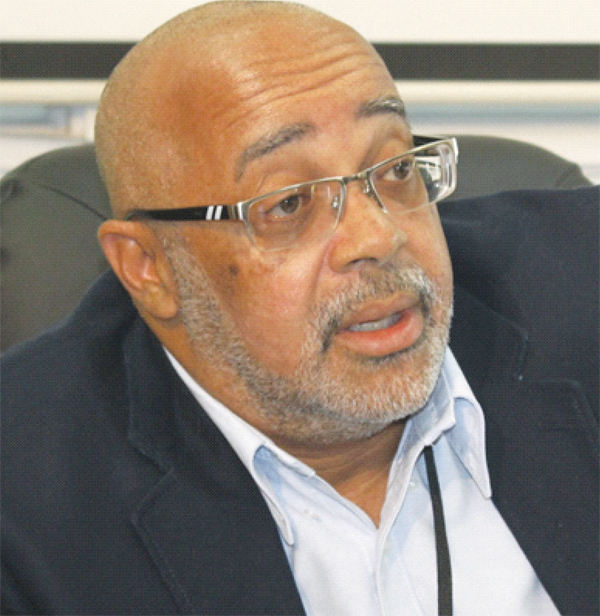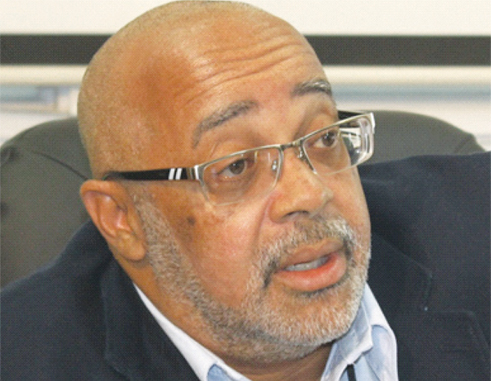Matter of ‘Greatest Priority’, Says OECS Director General

WITH Martinique now an Associate Member of the Organization of Eastern Caribbean States (OECS), regional trade stands to benefit immensely.
That subject just one of the key areas that OECS Director-General Dr.Didacus Jules delved deeply into as he spoke to the media last week on the new alliance with the French-speaking country.
Responding to questions related to why a more structured and intensive trade relationship still does not exist between Martinique and the OECS, Dr. Jules said that trade restrictions cannot be cited as reasons. Describing the situation as “just of of the ironies of life in the Caribbean”, Dr. Jules said that that island’s constitutional and political status might have a part to play in the dynamics.
“Martinique is right next door (and). We know nothing of what happens on a daily basis (there). However, through al-Jazeera and CNN we can know what’s happening right now in Moscow, New York and Afghanistan. That has to change. I mean, as next door neighbours, we need to know more about each other and be more up-to-date. At the State level, as we remove and dismantle some of the barriers and inhibitors to trade and move on to the free or easy movement of people, we will find that more and more commerce will happen,” Dr. Jules explained.
One of the region’s sore points for decades has been its inability to bridge the geographical divide among the islands as a result of either inadequate means of transportation or high cost of travel. Changing that situation, Dr. Jules, said involves many challenges, ranging from safety concerns, planning the routes and operational costs. Nevertheless, he said a high-speed ferry sea transport system among the islands is considered “the greatest priority for the (OECS) Authority and Heads of Government.”
“At the 59th Meeting of the OECS Authority, they said very clearly to us that we need to pursue this matter with the greatest speed. Now the idea is not for governments to invest because they don’t have the fiscal space to create a ferry (system). But what they’ve asked us to do is to explore private/public partnerships in order to make this happen,” Dr. Jules said.
The OECS Director-General said a number of proposals on the matter have already been made. He said that while interest is being shown by stakeholders to participate in joint ventures, due diligence must be crucial so as to ensure that interested parties have the requisite experience needed to provide such a service. The OECS Authority, he said, is also considering existing players in the sea transportation market, citing L’Express des Iles which has been providing sea transport between Saint Lucia and Martinique, Guadeloupe and Dominica for many years. The opportunity now exists for that company to consider expansion to broaden its routes.
“So they’re part of the mix. And that’s part of the excitement of Martinique coming on board because it means that an experienced ferry service that is already plying some of the routes can now look at the potential for expansion and maybe joint venturing with other private sector interests in creating a full umbrella of routes across the OECS. But what we need is regularity and cost-effectiveness. We have to make it faster, easier, a cheaper for people to travel,” Dr. Jules said.
Dr. Jules noted that with the opportunities for regional trade expanding with Martinique’s formal entrance into the OECS last week, the onus is now on seasoned OECS territories now to demonstrate their willingness to solve their own bread and butter issues without having to rely too heavily on foreign aid.
“At the end of the day, I think we need to get past the aid mindset – that we must always get help from somebody in order to do things,” Dr. Jules said. “What we need are no handouts but opportunities. Growing through trade and being able to stand on your own feet in the world of commerce in a globalized environment is the most important thing that we need to achieve.”
With Martinique’s accession as an OECS Associate Member last Wednesday, that country’s population (386,486 people as at January 2013) brought the OECS’ population (636,000 as at 2008) to over 1 million people.












![.[L-R] Parliamentary Representative for Castries Southeast, Lisa Jawahir & Talk show host, Timothy Poleon](https://thevoiceslu.com/wp-content/uploads/2026/02/Lisa-Jawahir-Timothy-Poleon-380x250.jpg)
![Public Service and Utilities Minister Stephenson King delivered remarks [Photo credit: VP]](https://thevoiceslu.com/wp-content/uploads/2026/02/Stephenson-King-380x250.jpg)

